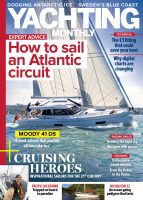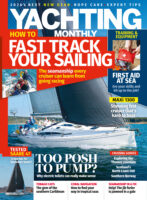The shipping forecast celebrates 100 years in 2024, but with long wave radio nearing the end of its life are there many more years left for this institution?
The long-wave shipping forecast reaches its centenary in 2024, though it’s not much of a celebration given that LW itself, ‘at the end of its life as a technology’, will be turned off sometime in the middle of the year. The forecasts will continue, though only twice a day on weekdays on Radio 4 FM, DAB, BBC Sounds etc, growing to three times a day at weekends. The long-wave bits of the mighty Droitwich transmitter will be closed down for the last time.
So the last of the metre-high water-cooled glass valves are beaming their final few months of 198kHz messages. A few years ago we were told there were only 10 of these valves in the world, and the BBC had to buy up the lot. Apparently trying to make new ones might cause the other Droitwich transmitters to fizz and blow. No longer will that intriguing glassware send out shipping forecasts and cricket commentary over land and sea.
It’s quite a moment; in 1992 Radio 4 ‘Save Long Wave’ demonstrators, fed up with the slow growth of good FM and not having yet dreamed of DAB, barracked Broadcasting House in a polite Radio 4 way, and expats on the near Continent worried at the loss of Test Match Special, their British birthright.
And sailors? Well, we knew we’d miss it. Long wave reached far out to sea, beyond Fastnet and along the edge of Iceland; my husband Paul once got the midnight news south of the Azores. Through the shash and crackle, all of us have leaned over a radio, waiting, muttering, ‘Did he say eight?’, scribbling down the coastal stations to scrawl a map in the yellow notebook. Some of us, not being followers of the national game, have also cursed roundly at our inability to hear The Archers or a comedy show because LW was handed over for weeks to Blowers and Johnners going on about a wicket or a cake. Or a cake shaped like a wicket…
But while radio continues on air, online, on digital if you bother, that long-reaching, fragile spread of LW has gone. It feels emotional, as when the first director-general Lord Reith, left the BBC unwillingly after some spats with the government and on his last night drove from London to Droitwich and insisted on personally closing down the National Transmitter at the end of the programmes. In the visitors’ book he wrote, ‘July 1st, 1.10 a.m. John Charles Walsham Reith – late B.B.C.’
Article continues below…
Why sailors love a good problem – Libby Purves on problem solving at sea
Never underestimate that for some boat-owners (though not necessarily their crews or partners), it is the maintaining and problem-solving that…
Why the old skills belong in a museum – Libby Purves
The Bethnal Green Museum of Childhood gave me a shock when I went there to interview curators and admire the…
The sentimental love of the shipping forecast has inspired poetry and art but we on the sea know its reality, have depended on it and longed for it. Once, we drifted around with a duff engine for a whole day in the northern North Sea; when you’re clear of the gas and oil rigs, it’s a very empty triangle.
That dependence brings a real emotional tie. It shaped one’s day and one’s hopes. Now, what with internet maps, coastal stations on channel 16 every few hours and the last BBC one you caught, if they vary at all there’s a frivolous temptation to just choose whichever one you fancy. Life was simpler when you had nothing to rely on except staring at ominous-looking clouds, reciting dodgy proverbs, or waiting a few hours for the calm voice of Charlotte Green reading out names and numbers.
But dear long wave is a technology whose time has passed.
We should be used to that by now, though. Technologies come and go. Who, under 50, remembers damnable Decca? Or nights waving a Seafix RDF with a wobbly compass on top to catch dots and dashes from Île Vierge through vomit-inducing earplugs? Who still pins their faith on a sharp pencil and a cocked-hat fix, remembers about doubling-the-angle-on-the-bow, or calculates estimated position including leeway? And that’s before you even get to sextants and the Marcq-St-Hilaire Method Of Driving Yourself Mad?
Actually, more people than you’d think. Just before Christmas a freak wave took out the bridge electronics on the Hurtigruten ship Maud, a fine seaworthy vessel on which we did the North Cape trip the night before. The announcement from the Danish coastguards was that it had ‘lost the ability to navigate’. Who did not, on hearing that, think anxiously about updating next season’s paper charts and whether the ship’s dog has chewed up the parallel rule?
Enjoyed reading this?
A subscription to Yachting Monthly magazine costs around 40% less than the cover price.
Print and digital editions are available through Magazines Direct – where you can also find the latest deals.
YM is packed with information to help you get the most from your time on the water.
-
-
- Take your seamanship to the next level with tips, advice and skills from our experts
- Impartial in-depth reviews of the latest yachts and equipment
- Cruising guides to help you reach those dream destinations
-
Follow us on Facebook, Twitter and Instagram.






